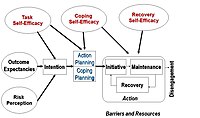
Photo from wikipedia
Compensatory health beliefs (the beliefs that an unhealthy behaviour can be compensated by a healthy behaviour) can interfere with adherence to fruit and vegetable consumption recommendations. Fruit and vegetable consumption,… Click to show full abstract
Compensatory health beliefs (the beliefs that an unhealthy behaviour can be compensated by a healthy behaviour) can interfere with adherence to fruit and vegetable consumption recommendations. Fruit and vegetable consumption, social cognitive variables and compensatory health beliefs were investigated via self-report at baseline (T0) and 8-week follow-up (T1) in N = 790 participants. Self-efficacy predicted fruit and vegetable consumption intentions. Planning mediated between intentions and T1 fruit and vegetable consumption. Compensatory health beliefs negatively predicted intentions at low self-efficacy levels only. The results propose the use of self-efficacy interventions to diminish the negative effects of compensatory health beliefs when forming fruit and vegetable consumption intentions and foster planning to translate intentions into behaviour.
Journal Title: Journal of Health Psychology
Year Published: 2017
Link to full text (if available)
Share on Social Media: Sign Up to like & get
recommendations!